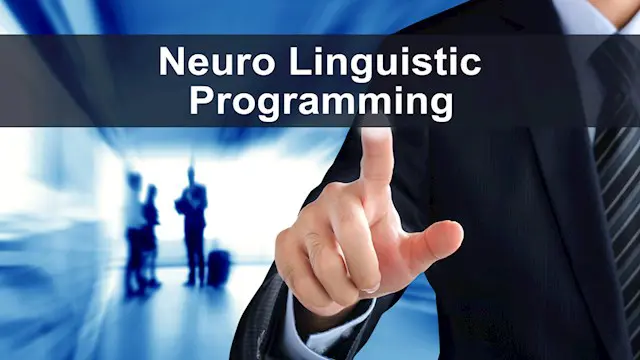
NLP Practitioner Online Training
3 Courses Bundle | Free eCertificate | Limited time | Tutor Support | Video Lessons
Frontier Education
Summary
- Reed courses certificate of completion - Free
- Tutor is available to students
Add to basket or enquire
Overview
This NLP practitioner course enables you to delve deeply into the NLP practitioner, to better explore, understand and apply relevant skills.
Through this NLP practitioner course, you will gain a world-class knowledge and understanding with a focus on the NLP practitioner, based on solving real-life issues.
This NLP practitioner course includes a whole host of practical tips and advice, helping you to develop yourNLP practitioner skills to become the therapist, coach, advisor, student, corporate employee, or related profession you can be.
This is three courses bundle and they are:
Course 1: NLP - Neuro - Linguistic Programming - The Ultimate NLP Guide
Course 2: NLP Master Guide To Achieving Extraordinary Results
Course 3: U&P AI - Natural Language Processing (NLP) with Python
Packed with videos, PDFs and exercises, it'll equip you with what it takes to be successful in today’s business landscape, covering a broad range of topics, including the power of outcomes, the structure of beliefs, the stages of learning, the power of pacing leading and much more.
Frontier Education provides those with no previous experience or working professionals with trailblazing, practice-based teaching, aimed to inspire and prepare you for a career in NLP Practitioner.
Certificates
Reed courses certificate of completion
Digital certificate - Included
Will be downloadable when all lectures have been completed
Curriculum
-
NLP 1:55:46
-
Intro 08:44
-
Foundation of NLP 50:53
-
Understanding Outcomes 41:25
-
The Foundation of Learning 41:36
-
The Foundation of Relationships 18:06
-
Understanding the Senses 1:05:08
-
Understanding Emotional Senses 32:11
-
Getting Inside the Mind 31:44
-
Understanding Strategies 29:15
-
The Power of Language 14:00
-
The Meta_Milton Model 49:11
-
The Power of Metaphores 28:53
-
The Power of Framing 33:52
-
Putting All Together 49:56
-
Action Plans 10:00
-
Section 1 - Getting an idea of NLP 1:17:20
-
Section 2 - Feature Engineering 27:17
-
Section 3 - Dealing with corpus 47:32
-
Section 4 - Create your vocab for any NLP 1:43:12
-
Section 5 - Word2vec any detail 1:08:53
-
Section 6 - Find and represent the meaning 25:30
Course media
Description
In this NLP Practitioner course, you will learn and understand the core theories and practices in NLP practitioner, developing a solid base of knowledge.You will understand core NLP practitioner theories and practices and be able to think critically, actively contributing towards the body of knowledge in the industry and pushing the boundaries with NLP practitioner skills.
With expert guidance and a combination of videos, PDFs, and worksheets, this course is designed to prepare you for a career or learning journey.
Course 1: NLP - Neuro - Linguistic Programming - The Ultimate NLP Guide
Introduction
NLP Course: What is NLP?
NLP Course: Modelling - A Powerful Tool For Rapid Success!
NLP Course: Learning Styles - Gain the Edge!
NLP Course: Value Systems - The Driving Force!
NLP Course: Eye Movements - Windows To The Soul - Truth Detector
NLP Course: Powerful Communication - The KEY to Success!
NLP Course: Emotional Mastery - Increasing & Decreasing Emotions
NLP Course: Anchoring - Connecting With Your Power
NLP Course: Scrambling Techniques - Rid Yourself Of Negative Emotions
NLP Course: Building Unshakable Confidence!
NLP Course: Final Thoughts & Tips!
BONUS NLP Lecture & Demo - LIVE!!!
Course 2: NLP Master Guide To Achieving Extraordinary Results
Course 3: U&P AI - Natural Language Processing (NLP) with Python
Section 1 - Getting an Idea of NLP and Its Applications
Section 2 - Feature Engineering
Section 3 - Dealing with Corpus and WordNet
Section 4 - Create your Vocab for any NLP Model
Section 5 - Word 2Vec in Detail and what is going on under the hood
Section 6 - Find and Represent the Meaning or Topic of Natural Language Text
You’ll also be able to access several exclusive bonus resources to help you along your NLP Practitioner journey, including:
- Developing visualisation and hearing
- Understanding emotional states
- The power of communication
- The unconscious mind
- Behaviour, values and intention
Top reasons to Study Online at Frontier Education
- Tailor-made: Course adapted to market needs and interests
- Flexible programs: study and work at your own pace on easy-to-use web platforms
- Online education: progressive teaching methods with video or easy understanding the medium
- Multicultural: connect with classmates from all corners of the globe
Who is this course for?
This NLP Practitioner is ideal for people looking to progress their career into a therapist, for those who want to become coaches, as well as looking to further develop their skills and knowledge.
Requirements
No prior knowledge or experience required
Questions and answers
Currently there are no Q&As for this course. Be the first to ask a question.
Reviews
Currently there are no reviews for this course. Be the first to leave a review.
Legal information
This course is advertised on reed.co.uk by the Course Provider, whose terms and conditions apply. Purchases are made directly from the Course Provider, and as such, content and materials are supplied by the Course Provider directly. Reed is acting as agent and not reseller in relation to this course. Reed's only responsibility is to facilitate your payment for the course. It is your responsibility to review and agree to the Course Provider's terms and conditions and satisfy yourself as to the suitability of the course you intend to purchase. Reed will not have any responsibility for the content of the course and/or associated materials.


